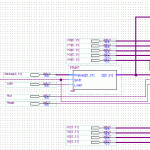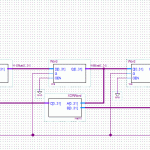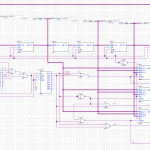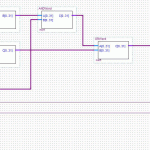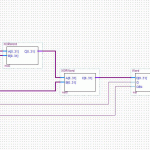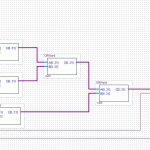Pretty soon after I wrote that last post, I got sent up north for work for a long while. Which is great, don’t get me wrong, I like money as much as the next guy. It really limits my ability to physically build, though.
So I missed the contest entry deadline. Totally not surprised. I’d need another month to finish, but I’m putting this on the backburner for now.
So far, the only thing I’ve finished is the simulation. That may not sound like much, but let’s run through some numbers:
The design consists of 50 functional blocks representing (I think I counted right) 199 discrete CMOS ICs
The input, which is five words or 160 bits long, is clocked in 1 word at a time.
The output, also five words, pops out like magic 80 clocks later.
I haven’t done a proper timing analysis, but some back-of-the-envelope calculations (literally – I did this on the blank side of an envelope) give me a typical propagation delay of 545ns. This allows for a clock speed of about 1.8MHz, and tests about 22,000 combinations per second.
That’s pretty fast, and quite okay for a first draft. But it can be improved.
Right now, this circuit is set up into two cyclical stages. Only one input can be processed at a time as previous iterations of the data affects itself.
If the design were to be linearized, proper pipelining could make the design 80 times faster. There are also definitely some improvements to be had in designing for higher speed chips and in-depth timing analysis to figure out how tight you could get away with for pipelining.
But as I said; I’m killing this for now.
Shortly after I designed this, my harddrive failed and lost the original simulation files. I use cloud backup services now. Fortunately I had screencaps, though. Here is a pure hardware SHA1 encoder:
- SHA1
- Stage 1
- Stage 2
- Function 1
- Function 2
- Function 3

